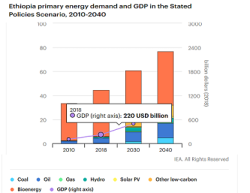The Federal Government of Ethiopia is set to issue coal production licenses for eight companies to enable the country end import of coal within one year period.
The Council of Ministers of Ethiopia on Wednesday has given green light for the Ministry of Mines to ink an agreement with the eight companies who are interested to start production of coal in different parts of the country.
During its meeting, the Council has reviewed the benefits of the mining projects both for the country and the communities where they produce coal.
Following the Council’s approval, the Ministry of Mines is expected to issue coal production license for the eight mining companies in the coming few days or weeks. The name of the eight companies has not been public yet.
Coal is among the major minerals found in Ethiopia in bulk especially in Oromia region where youth in different areas are organized and engaged in small scale production of briquets that is being used as charcoal for cooking. The ministry of mines of Ethiopia claims that there is 430 million tons of potential of coal in the country.
In addition to Oromia, some areas in Amhara and Southern regions are also reported to have huge coal mineral. In mid-June 2021, Sun Mining Coal factory the first coal factory in Ethiopia and a sister company of Sunshine Investment Group owned by the Ethiopian tycoon Samuel Tafesse, has laid a foundation to commence coal production at Gibe Ibare Kebele in Abeshge Woreda of Gurage Zone.
It was reported that when it starts production Sun Mining will be able to produce a total of 800,000 tons of washed coal per year from the 23.3 hectare land the company has secured.
Though Ethiopia is endowed with huge coal reserves, the country has been spending some $200 million hard currency for importing coal, which is mainly used by different high energy consuming factories such as for running machineries that produce cement and steel, among others.
In Oromia Region the Yayo Woreda (district) is endowed with over 179 million tons of coal potential, according to the study made by Changshi China based company.
Even though, coal is known as among the most environmentally pollutant energy sources releasinh huge amount of Carbon dioxide (CO2), most of the countries in both developed and developing world – from South Africa, India, and Australia to China and the United States – are still using coal as their major energy source.
It is estimated that coal contributes to about 25 percent of the total global energy source. In 1973 coal held a share of 24.5 percent of global energy supply, while oil accounted for the largest share at 46.2 percent, according to IEA’s estimates. In 2018, the share of coal increased to 26.9 percent, while oil’s share of global energy supply dropped to 31.6 percent.
In the case of Ethiopia, the share of coal in energy supply is estimated to be around 0.5 percent. The country’s major energy source still remains to be dominated by waste and biomass, which contributes to about 92 percent, while oil represents to about 6 percent, and hydro 1.6 percent.
The commencement of the eight coal mining companies is expected to increase the share of coal in energy supply while cutting the country’s hard currency spending on the import of both coal and fernes oil, among others.
Ethiopia aims to increase its energy generating capacity by 25 000 megawatts by 2030: 22 000 megawatts of hydro; 1 000 megawatts of geothermal; and 2 000 megawatts of wind by 2030.

